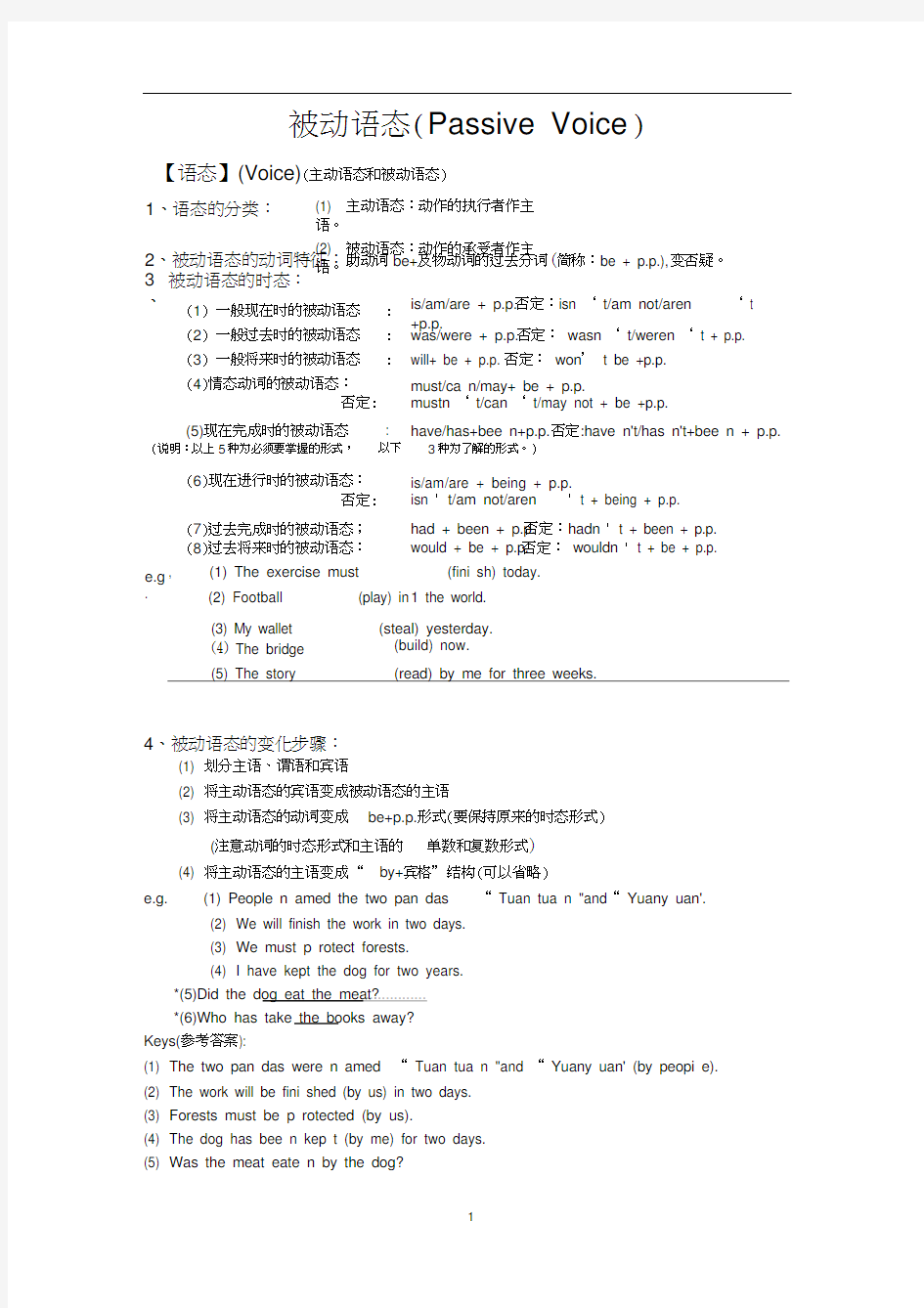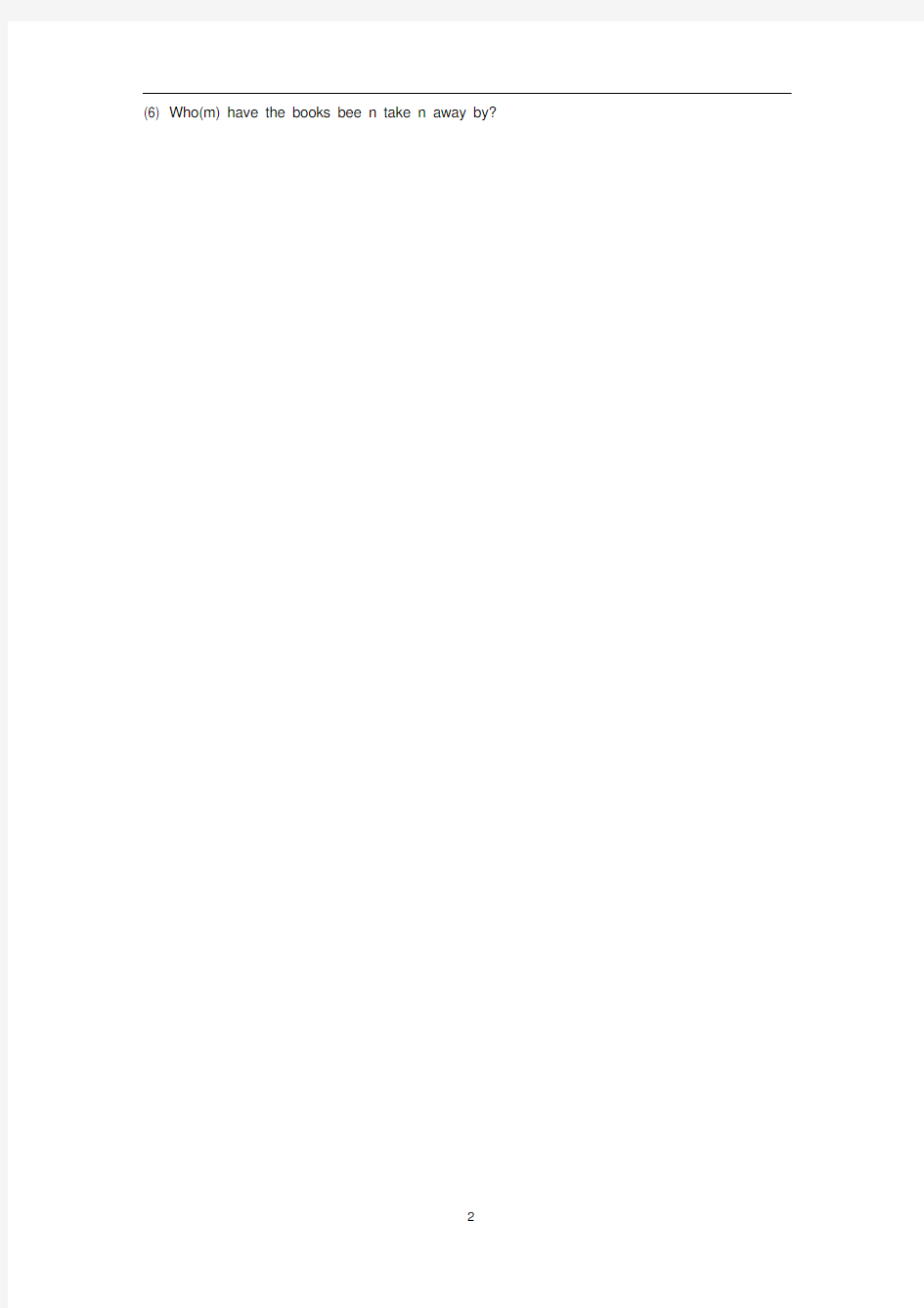被动语态讲解及练习汇总


被动语态(Passive Voice )
【语态】(Voice)(主动语态和被动语态)
4、被动语态的变化步骤:
(1) 划分主语、谓语和宾语
(2) 将主动语态的宾语变成被动语态的主语
(3) 将主动语态的动词变成 be+p.p.形式(要保持原来的时态形式)
(注意动词的时态形式和主语的
单数和复数形式)
(4) 将主动语态的主语变成“ by+宾格”结构(可以省略)
e.g.
(1) People n amed the two pan das “ Tuan tua n "and “ Yuany uan'.
(2) We will finish the work in two days. (3) We must p rotect forests. (4) I have kept the dog for two years. *(5)Did the dog eat the meat? ............... *(6)Who has take the books away? Keys(参考答案):
(1) The two pan das were n amed
“ Tuan tua n "and “ Yuany uan' (by peopi e).
(2) The work will be fini shed (by us) in two days. (3) Forests must be p rotected (by us).
(4) The dog has bee n kep t (by me) for two days. (5) Was the meat eate n by the dog?
2、被动语态的动词特征:助动词be+及物动词的过去分词(简称:be + p.p.), 变否疑。
3、
被动语态的时态:
(1) 一般现在时的被动语态 : is/am/are + p.p. 否定:isn ‘ t/am not/aren
‘ t +p.p.
(2) 一般过去时的被动语态 : was/were + p.p. 否定: wasn ‘ t/weren ‘ t + p.p.
(3) 一般将来时的被动语态
: will+ be + p.p. 否定: won ’ t be +p.p.
(4)情态动词的被动语态:
must/ca n/may+ be + p.p.
否定:
mustn ‘ t/can ‘ t/may not + be +p.p.
(5)现在完成时的被动语态
:
have/has+bee n+p.p. 否定:have n't/has n't+bee n + p.p.
(说明:以上5种为必须要掌握的形式,
以下
3种为了解的形式。)
(6)现在进行时的被动语态:
is/am/are + being + p.p.
否定:
isn ' t/am not/aren ' t + being + p.p.
(7)过去完成时的被动语态;
had + been + p.p.否定:hadn ' t + been + p.p.
(8)过去将来时的被动语态:
would + be + p.p.否定: wouldn ' t + be + p.p.
e.g .
, (1) The exercise must
(fini sh) today.
(2) Football (play) in 1 the world. (3) My wallet (steal) yesterday.
⑷ The bridge (build) now.
(5) The story
(read) by me for three weeks.
(1) 主动语态:动作的执行者作主语。
(2) 被动语态:动作的承受者作主
语。
1、语态的分类:
(6) Who(m) have the books bee n take n away by?
5、不用被动语态动词:
(1)have 有
(2)look,sound,smell,taste 等连系动词(3)take place /happen
(4)get to/arrive(at/in)/reach (5)
(6)
(7)
(8)到达
rise 升起, 上升ring (铃响)
begin/start 开始lie 躺
※^ The book sells well.(
这本卖得好)※^ The meat cooks well.
(8) return ( 回来,回归—不用被动, 归还 —可用被动语态 ) (9)
leave (离开—不用被动语态, 留下/ 遗忘—可用被动语态 )
(1) _________ The idea (sound) great. Let ' s go together. (2) The story ______ (happen) in USA ten years ago. (3) The Olympics _______ (take place) in Beijing in 2008. (4) The kind of bicycle ____ (sell) well.
Keys( 参考答案 ): (1)sounds (2)happened (3)took place
6、常用被动语态:
(1) be located in (3)be called (5) be made up of
(7) be invited to do sth
e.g. (1)The streets _____
heavily last night. homework.
A. stay, do
B.to stay, do
Keys( 参考答案 ):
(1) People were made to leave their home (by floods). (2) D
8、 动词后面跟双宾语:
( 人在物前不用介词,物在人前要用介词 要么
物)变成被动语态的主语 注
意 :make/buy/draw 常与 for 连用 e.g. make sth for sb/buy sth for sb (1) U ncle Li gave us a big dinner yesterday.
We _____ _____ a big dinner _____ Uncle Li yesterday.
A big dinner _______________________ us ____ Uncle Li yesterday. (2) Dad will buy me a present.
I _____ _______ _______ a present ____ A present _____ _____ ____ _____ me
Keys( 参考答案 ):
(1) were given, by ; was given to, by (2) will be bought, by ; will be bought for, by
e.g.
(4)sells
(2)be covered with ( 4) be made of(in/from) (6)be asked to do sth (8)be used for doing sth/to do sth
(cover) with snow because it _________ (snow)
(2)
We ____ (tell) to come to school yesterday.
(3) _________________ Many friends (invite) to my birthday part because it is my
birthday tomorrow.
Keys( 参考答案 ):
(1)was covered, snowed (2) were told
(3) were invited
7、 动词不定式的省 to 形式 的被动语态:(变被动时,要还原 ※ make
sb do sth —be made to do sth ) ※ see sb do sth/watch sb do sth/hear sb do sth/notice sb do sth (1) Floods made people leave their home.( 被动语态
to )
e.g.
)
we were made
our
C.to stay, to do
D.stay, to do
to 或for)-只需将其中的一个宾语(要么人, e.g.
Dad. Dad.
9、“动词 +副词”或“动词 +介词“结构
在变成被动语态后,介词或副词不能漏掉 (1)We must look after our eyes. (2)How did you deal with the dog?
Keys( 参考答案 ): (1) Our eyes must be looked after by us. (2) How was the dog dealt with by you?
10、同步练习
被动语态练习
I. 选择最佳答案 :
) 1. English
at the corner of the street.
A. will be published
C. is being published
D. has been published
) 12. The sports meeting
be held until next week.
A. speaks
B. are spoken
C. is speaking
D. is spoken
) 2. This popular song
by us after class.
A. often sings
B. often sang
C. is often sang
D. is often sung
) 3. This kind of bike
in Germany.
A. makes
B. made
C. is making
D. is made
) 4. New computers
in our school.
A. is used
B. are using
C. are used
D. have used
) 5. Our flat must clean.
A. keep
B. be kept
C. to be kept
D. to keep A. is building ) 7. The key
A. was left ) 8. Doctors
A. need
) 9. His new book
B. is being built
C. been built on the sofa when I left. B. will be left
C. is left
all over the world. B. are needing C. are needed
next year.
D. be building
D. has been left
D. will need
) 10. French
in every country.
A. is not spoken
B. are spoken
C. is speaking
D. is not speaking ) 11. These papers
yet.
A. have not written
B. have not been written
C. has not written
D. has not been written A. didn't
B. won't
C. isn't
D. doesn't e.g.
in Britain. ) 6. A new hospital
B. is publishing
) 14. The two panda were taken to Taiwan us.
A. for
B. in
C. to
D. by
) 15. The book
A. sells good
B. sells well
C. is sold good
D. is sold well ) 16. The broken bike here by Old Wang.
II 1.2.3.4.5.6.7.8.9.
A. can repair
) 17. The jar
A. used; keeping
C. is used; to keep
) 18. Cotton
A. grows
) 19. The bridges
A. is built
) 20.These babies
B. can be repaired
C. can be repairing
for hot water.
B. was used; keeping
D. are used; keep
in the southeast of China.
B. is grown
C. were grown
a few years ago.
B. built
C. were built
in the hospital.
D. can repairing
D. will grow
D. was built
A. are taken good care
C. take good care of
) 21. These bridges stone.
A. are made of
B. made of
) 22. These books
A. are written
B. are taken good care of
D. take good care
C. are made into
D. made into
by the writer in the 1980s.
B. were written
C. are writing
.用所给动词的适当时态和语态填空。
D. were writing
this kind of car (produce) in Shanghai?
10
.11
.12.13.The shop
Some children
Some new houses
What language
The colour TV
The doctor said Jim must
(close) at this time of day.
(take ) good care by the nurse.
(build) by the villagers themselves.
(speak) in Canada?
(buy) in that shop three days ago.
(operate ) on at once.
the bridge (repair) yet? ”-“ Yes. ”
We are in Grade One this year, so we (teach ) physics next year.
Where
The big tree
The Great Wall
the film
(be) you last night? -”-
“ I
(blow)down in the storm last night.
(know) all over the world.
(ask) to help Tom at home
(show) many times since last Sunday?
Over 140,000 peo pie by the recent tsun ami.
14 ..the street lights usually (turn) on at seve n in summer
evening?
15. Shanghai Museum _ III .按要求改写句子(locate) in the centre of Shan ghai.
1. Mr. Smith told us some customs of En gla nd. (改为被动语
态)
We some customs of En gla
nd.
2. You can keep the book for two weeks. (改为被动语
态)
The book can for two weeks.
3. The recent tsu nami killed over 140,000 peo pie. (改为被动语
态)
4. We should take good care of our desks. (改为被动语
态)
Our desks should good care of our desks.
5. We will hold the meet ing this after noon. (改为被动语态)
The meeti ng will this after noon.
6. The teacher doesn ‘ t teach English in our school改为被动语
态)
En
glish
in our school.
7. They saw a UFO flying in the sky.(改为被动语态)
A UFO flying in the sky.
8. They sell all kinds of watches in the shop.(改为被动语态)
All kinds of watches in the sho
p.
9. Mr. Smith told us some customs of England.(改为被动语态)
told some customs of En gla
nd.
10. People can turn matter from one state to another.(改为被动语态)
Matter can from one state to ano
ther.
11. The writer gave her a book after talking to her. (改为被动语态)
A book to her by the writer after he talked to her.
12. Did you grow vegetables? (改为被动语态)
vegetables
13. Did he repair this desk yesterday? (改为被动语
态)
this desk yesterday?
